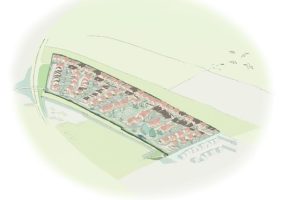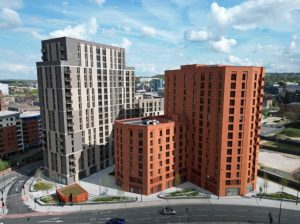Property People: Property markets face "treading water" in 2017 say specialists

After a busy first month of 2017, regional property experts from Savills, JLL and Knight Frank weigh in on what they think the office, retail and industrial property markets will look like this year.
OFFICE
With Yorkshire growth in ‘higher value’ office jobs forecast to outperform London in 2017, there will no doubt be continued demand for office space, say our experts. Technology will also be a key factor in the future of the office market, said John Neale, head of research in the UK for JLL at a property seminar last month.
“Smart cities and the rise of innovation districts will give rise to a new breed of office building, and employers will move their attention to amenities,” he said.
In terms of the size of offices, Neale said that with smaller businesses competing with the formerly dominant corporates, long leases will be threatened and are not as secure as they used to be.
Richard Thornton, director of the office agency at JLL, said that the office market had been “challenging” in 2016 with demand down 25% from 2015, but the good news was that 44% of office space supplied was grade A.
Thornton predicted that from prices of around £25 to £27 per sq ft, Leeds will see £30 per sq ft mark reached by the end of the year.

“Brexit certainly hasn’t fuelled confidence for growth,” said Fairhurst, “so we expect to tread water a bit this year.”
Despite this, the emergence of different sectors in Leeds will help. “There won’t be the big deals we’ve seen previously, but there will be more of them,” said Fairhurst. “Companies we dealt with five years ago that wanted 500 sq ft are now looking at taking 5,000 sq ft as they grow and shift from incubators.”
This will also mean a wider variety of office space in different parts of the city from the traditional professional areas will be taken up, he said.
There has also been an unusual trend in the Leeds market, with offices, including KPMG’s former site at No 1 Embankment, being leased by educational institutions. The Leeds UTC, the Ruth Gorse Academy and Elliott Hudson have been expanding and taking up what would normally be prime office space.
Mark Wilson, Savills 
Wilson said that 55% of Leeds office investment last year was made by overseas funds, and that the area remained attractive, particularly to Spanish, Middle Eastern and US investors.
RETAIL/LEISURE
Director in JLL’s retail and leisure division Nick Ferris said that Christmas trading has been “solid and robust” for many retailers – a good sign for the market.
“Even the Big Four supermarkets are beating expectations in the face of the German discounters,” he said. “Leisure will be the real area of growth – it increased 6.9% last year compared to an increase in retail spend of 1.1%.”
Ferris highlighted retailers including Lidl, Aldi and M&S Food Hall as ones to watch next year, whilst B&M Bargains, Home Bargains, Next and Primark will be looking to make headway in the out-of-town market.
Savills director and a retail specialist Steve Henderson said that Leeds in particular had been “strengthened” by the introduction of Victoria Gate this year, but said it would be a “transitional period” as higher end retailers move towards the Victoria Centre. “There will be time spent asset managing the transition as we group certain uses together.”
He predicted that Leeds would have between 10 and 20 new entrants in the next year, and a “churn” of movement and ‘rightsizing’ will occur, with retailers like Zara and H&M wanting to expand or consolidate.
INDUSTRIAL
Richard Harris, lead director in JLL’s Industrial Agency team (pictured below left) said that there was a general picture of demand outstripping supply in the Yorkshire industrial market following the completion and announcement of iPort Doncaster sites
“Speculative development is extremely limited,” he said, ” and Big Box requirements are only going to get bigger.”
Demand led by growing online retailers and delivery companies who will be aiming to reduce time to deliver and keep up with competitors with the introduction of new technologies.
“Like with offices there will be an increased amount of technology in warehouses and distribution centres, as automation and robotics are developed, but it will be a “very difficult year” particularly for agents in the industrial market,” he said.
However Rebecca Schofield of Knight Frank said that outlook for the industrial property market in Yorkshire for 2017 “is bright”.
She commented: “We are seeing speculative development of small-to-medium sized units making a much needed return to the market and we are starting to see continued rental growth and confidence within the market, which augurs well for the future.
“As with other regions, she said, “there is a dearth of high quality existing and new build industrial stock currently available in the area, specifically in the small and mid-sized range units,” she added.
In South Yorkshire, Schofield said, the Advanced Manufacturing Park is “continuing to flourish” and that Sheffield’s Smithy Wood Business Park and Capitol Park in Barnsley were “potential hotspots”.
Meanwhile in West Yorkshire, Iain McPhail, partner in the Leeds office, said: “Current market conditions have led to renewed speculative development in West Yorkshire.”
Wilton Developments will be speculatively developing their next scheme, Kinetic 45, following the success of Connex 45 in the Leeds City Region Enterprise Zone,
“Notably,” he said, “there remain no existing ‘grade A’ warehouses in West Yorkshire currently available above 200,000 sq ft.”
Savills director Dave Robinson said agreed with the slightly less buoyant outlook for industrial property, particularly following last year’s high. The last time industrial property development reached equivalent levels was in 2007, he said.
The predicted lack of supply was dampening the potential of the industrial market, with political situations such as the Brexit decision halting progress, particularly with speculative development, he said.
“There’s no where near enough speculative development currently, but this will push investor interest,” he said. But even if they do embark on a project, it will be at least 6-12 months before it can be realised.
“Amazon really led things in terms of takeup in 2016. The trend for online shopping will continue, but Leeds is really crying out for development,” he said.









